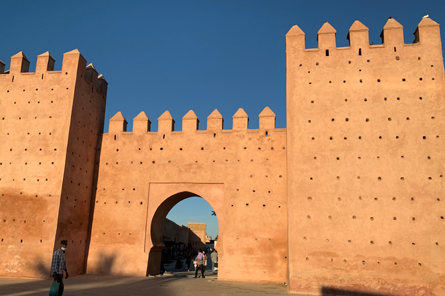Morocco
In Morocco, DCAF supports democratic transition and good governance, and promotes transparency, accountability, human rights, and gender equality.
DCAF's strategy in Morocco is coordinated with national stakeholders to contribute to their efforts to reform security and justice sector, and to strengthen human security.
For more information about our programme, download our DCAF Morocco Programme Factsheet.

Workstreams/Projects
DCAF’s intervention logic is organised around 4 interrelated priorities to achieve results:
- supporting independent and parliamentary oversight;
- supporting transparent communication and information-sharing;
- promoting an inclusive dialogue on security needs and policies; and
- supporting effective change of security providers.
Morocco’s 2011 Constitution reaffirms the Kingdom firm commitment to the rule of law and the protection of human rights. It proposes a new governance model that strengthens accountability through independent oversight institutions, and protects human rights in accordance with international laws and standards.
Good security sector governance, justice reform, trust in legitimate and effective institutions, the prevention of ill-treatment, the promotion of integrity and accountability are other national policy priorities.
Since 2004, the work of the Instance Equite et Reconcilation have made security sector governance and justice reform a priority for democracy. Major reforms have contributed in the recent years to strengthen the accountability, transparency, and efficiency of the security sector, and to settle a human-rights compliant framework.
Since 2009, DCAF has engaged with government institutions and oversight and human rights bodies in an effort to support them with the implementation of security and justice sector reform.
DCAF’s Morocco programme is entirely funded by the Trust Fund for North Africa (TFNA), a unique pool-funded mechanism was created in 2012 to respond quickly and flexibly to requests for assistance from the governments of Egypt, Libya, Morocco, and Tunisia.
DCAF works with parliaments and independent institutions to promote oversight and accountability. DCAF supports independent oversight institutions in using knowledge, skills and new structures to exert their mandate effectively, so as to enhance their integrity, accountability, coordination with security sector institutions.
Results
NATIONAL ANTI-CORRUPTION AUTHORITIY (INPPLC)
In 2017, DCAF and the INPPLC signed a MoU to cooperate in the prevention of corruption and the promotion of integrity, as essential components of good security sector governance. DCAF accompanies INPPLC in the exercise of its extended mandate, granted by the law 46.19 (adopted in March 2021), enhancing its capacities to detect, prevent, and fight corruption, and raise awareness on corruption.
Publications/Resources
DCAF believes enhanced, responsive access to information and more transparent communication policies will increase citizens’ trust in national institutions. In partnership with Moroccan institutions, DCAF promotes access to information, and strengthens crisis communication capacities within the justice and security sector.
Results
NATIONAL SCHOOL OF ADMINISTRATION (ENSA)
DCAF enhanced the capacity of justice and security sector institutions to communicate effectively on security-related issues, and to manage the relationship with the media, with a focus on delivering solid context-specific crisis communication tools and practices.
DCAF facilitates an inclusive dialogue on citizens’ security needs with emphasis on the most vulnerable groups (youth, minors, women, etc.). It works with local partners and civil society to assess human security needs and promotes an informed dialogue between Moroccan CSOs and the security sector on responses to gendered security needs and policies.
Results
UN WOMEN and the Moroccan justice oriented CSO “ADALA”
DCAF analysed justice and security sector responses to violence against women (VAW) throughout the penal chain, with a focus on perceptions of women victims of violence towards security and justice responses. DCAF developed recommendations for improved policy, practices and implementation of law 103.13 on violence against women.
The Moroccan youth led CSO “Prometheus Institute for Democracy and Human Rights – IPDDH”: To promote the development of inclusive policies and strategies for Moroccan youth, and to contribute to Morocco’s New Development Model goals, DCAF led a gender-sensitive research into youth security needs in eight Moroccan localities among youth aged 18 to 34 (of which 45% were women). The research analyses perceived human security needs and challenges related to family, economy, health, public space and politics.
Publications/Resources
- Gouvernance du secteur de la sécurité au niveau local
- Infographic COVID-19 & Violence Against Women in Morocco (AR - FR)
DCAF supports change management of the security sector in Morocco and bridges the gap between policies and practice. To that aim, DCAF provides executive education for security sector managers, prisons professionals, prosecutors and judges, emphasizing transparency, accountability, and human rights compliance as key principles.
DCAF has notably supported the implementation of the Optional Protocol to the Convention against Torture (OPCAT), by building the capacity of justice professionals, prison staff, and forensic doctors to fulfill their professional obligations arising from Kingdom’s ratification of the OPCAT in 2014.
Results
CEDHD/DGAPR
DCAF and CEDHD published a comprehensive study on the situation in Moroccan prisons, combining a human rights-based approach and a public policy analysis. The study, which takes stock of the progress and remaining challenges made during the strategic period 2016-2020, analyses the nexus criminal policy/penitentiary strategy, and the impact of an obslodete code on the penitentiary system - a major cause of deficits and prison overcrowding. The report also informed public debate and the dialogue between security sector institutions and CSOs on criminal code reform and alternative to detentions.
Publications/Resources
- Report on the Situation of Prisons in Morocco (2016-2020)
Media coverage: Report on the situation of prisons in Morocco. A light of hope in a corner of darkness (French), Report monitoring the reality of prison institutions in Morocco in the period 2016-2020 (Arabic article 1) (Arabic article 2). - Report on the State of Health Emergency - Security governance and human rights (AR - FR)
- Report on the State of Health Emergency Part 2 - Post confinement phase
- Training Manual for Prisons Staff
- Guide on Prisons Legislation (FR)
- Prisons Legislation - Collection of national and international standards (FR)
PUBLICATIONS
Contacts
Cécile Lagoutte, Programme Manager (c.lagoutte@dcaf.ch)
Sara Lahoucine, Project Officer (s.lahoucine@dcaf.ch)